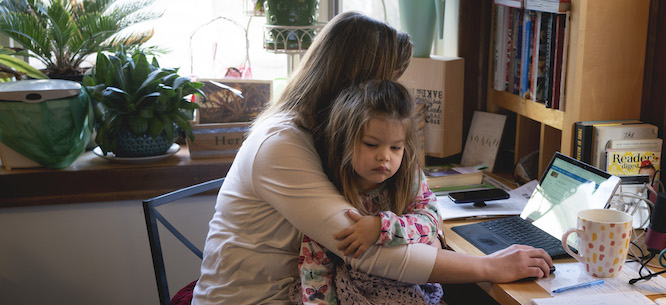Minnesota Senate Denies School Support Staff Job Security
Minnesota Senate Denies School Support Staff Job Security
A new state bill aimed to protect the jobs of hourly school employees amid the COVID-19 pandemic. But language protecting those workers was rejected by the Senate.

[contentblock id=coronavirus]
Since school districts across the country began shutting down and shifting classes online in March, teachers have been vaunted as heroes for rapidly reorienting their students around digital learning and class meetings via videolink. We hear less about the school support staff—the paraprofessionals, library technicians, school bus drivers, cafeteria workers—whose jobs have also been turned upside down by the pandemic, and who in many cases continue to serve their schools during the lockdown.
In Minnesota’s public schools—which were rocked by a strike by teachers and staff in St. Paul just before the lockdown—school support workers, who mostly earn hourly wages, unlike teachers and licensed staff, are working every day to help students and teachers transition to online learning while providing essential services to children in their communities. But they are also facing the loss of their jobs at a time when the revamped educational infrastructure could use all the support it can get.
Sarah Nichols, a media technology and testing assistant for Roseville Area Schools, usually helps manage the computer labs and other technology at her school’s library and supports library staff. Since the lockdown, she has adapted her job to fit the new distance learning system.
“With this pandemic, there’s no state testing, and there’s no library happening. . . . What I’ve been doing over the last two months is tech support [for] families. I’ve gotten iPads, Chromebooks, all of those things ready, and distributed them, and now I’m continuing to do tech support.”
Some other school support staff are still going to school every day to provide emergency child care for the children of frontline healthcare workers. Others are making and distributing about two thousand meals a day for local kids who rely on school to stay fed.
Nichols, a member of AFSCME Council 5, is relatively lucky, because her district has agreed to keep her working. But others are threatened with mass layoffs because, despite the essential services they provide their school communities, their jobs are not guaranteed as long as their school buildings remain shuttered.
Public sector unions have been pushing for job protections for paraprofessionals, drivers, and others so that they can have economic security going forward as the schools are closed indefinitely. A new state bill aimed to protect the jobs of hourly school employees, as well as employees of fee-based programs such as preschools, by shielding them from layoffs. But after it was passed in the House earlier this month, the language protecting those workers was rejected by the Senate last Saturday.
Though teachers have been praised for doing yeoman’s work as they shepherd their students through the crisis, the school staff who make this work possible are often politically invisible.
If they were to keep school support workers employed, school districts would likely have to alter their job duties, or perhaps cut their hours. Facing this uncertainty, Nichols said, “The people who are most vulnerable in this aren’t licensed teachers. . . . The teachers and the licensed staff are experiencing school closures very differently than the non-licensed staff.”
Given that the hourly school workers are the lowest paid employees in the public education system, as well as the most racially diverse, Nichols said:
For us, this is an issue of equity, because our workers are diverse, many of them being Black and brown, first-generation American. We’re often part-time workers, hourly workers, living paycheck to paycheck. So being laid off, we’d be left with not enough to stay above water. . . . We love the kids just as much, we provide [as many] valuable experiences to the kids as anyone in the district. And we’re doing the frontline work. And we deserve to know that we’re gonna be paid throughout the pandemic.
As the educational disruption of the pandemic hits the poorest and most disadvantaged families the hardest, having an inclusive school community—even when attending school from home—still matters. As Nichols said:
One of the things that isn’t talked about is the role of paraprofessionals in our kids’ education, especially when we look at the racial and ethnic disparities. . . . It’s really important to have people working with students who reflect the ethnic and racial diversity of the students. . . . We, as a state, work diligently to increase [the number of] teachers of color and indigenous teachers, but we can’t overlook the fact that [the] people who reflect the ethnic and racial diversity of our students are the paraprofessionals in these districts. The students will disproportionately be affected by layoffs of those paraprofessionals who actually have lived experiences similar to their own.
Michelle Chen is a member of Dissent’s editorial board and co-host of its Belabored podcast.




